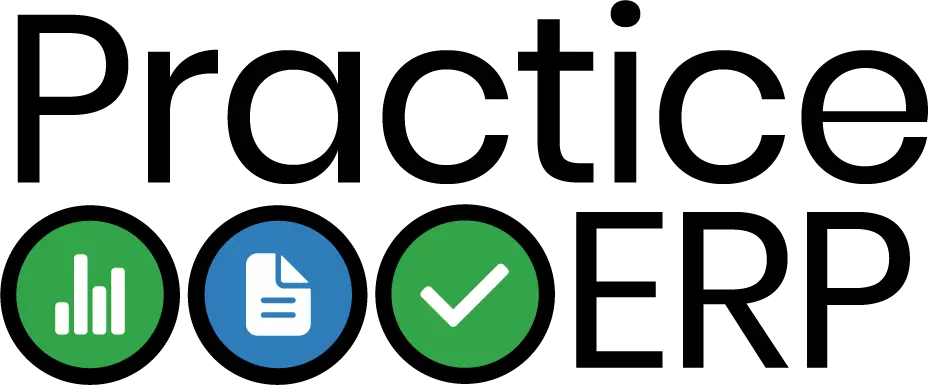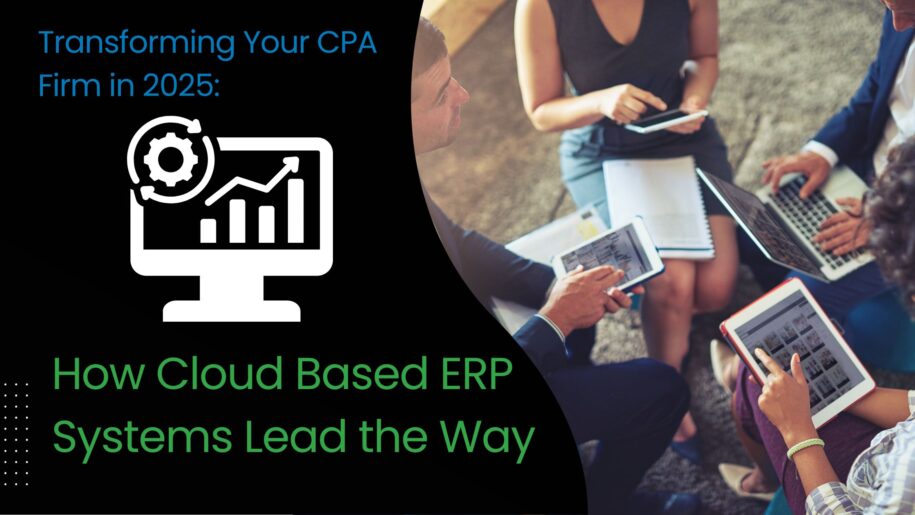Table of Contents
ToggleThe Role of Technology in Transforming CPA Firms: Trends, Benefits, and Challenges
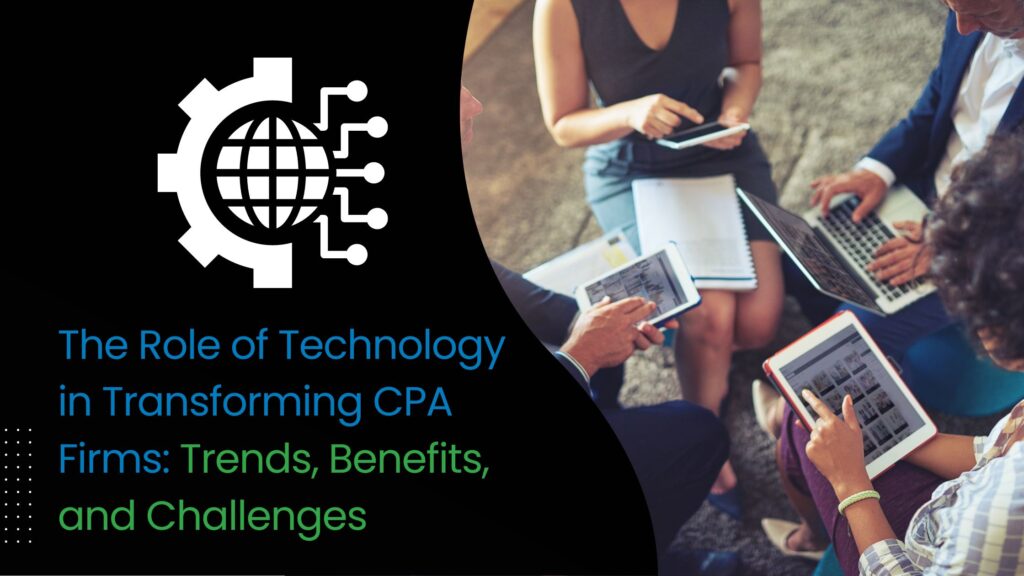
In today’s fast-paced business environment, CPA firms are continuously evolving to stay relevant and competitive. One of the most critical areas where transformation is taking place is through the integration of new technologies. However, keeping up with these advancements can be challenging. As a CPA firm, finding the time to research and implement the right technology is often sidelined due to the demands of client work, leaving little room for evaluation in the so-called “off-season”—if such a season even exists.
But adopting new software and hardware is essential for CPA firms to work more efficiently, effectively, and securely. In this blog post, we’ll explore the latest technology trends impacting accounting, the benefits of these tools, and the challenges that firms face in the process of adapting to these changes.
Technology’s Growing Role in CPA Firms
Technology has always been a part of the accounting profession, from the early days of ledgers to modern cloud-based software. However, the pace at which technology evolves today is unprecedented. For CPA firms, staying ahead of these changes is essential for maintaining a competitive edge and delivering value to clients.
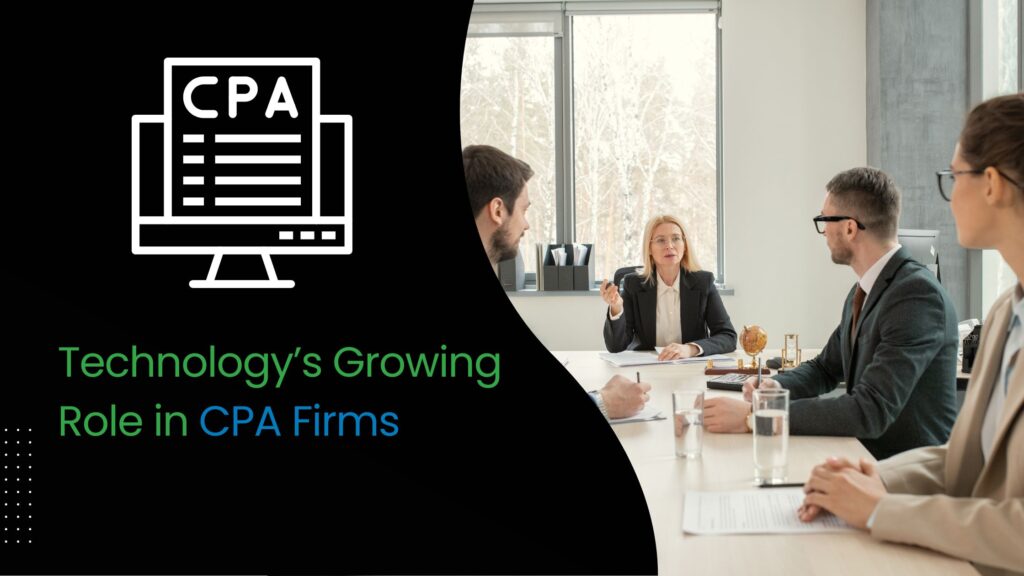
Let’s explore some key areas where technology is reshaping the accounting profession:
1. The Explosion of Data
Data is becoming more abundant and accessible than ever before. As businesses generate massive amounts of financial, transactional, and customer data, CPA firms are tasked with sifting through this information to extract valuable insights. Technologies like big data analytics and data mining help CPA firms analyze large datasets, offering deeper insights that can assist clients in making informed business decisions.
2. The Rise of Artificial Intelligence (AI)
Artificial intelligence (AI) is revolutionizing accounting by automating routine tasks that previously required manual effort. For example, AI can handle data entry, audit processes, and even some aspects of financial reporting. This frees up CPAs to focus on more value-added activities such as advisory services, where human insight and expertise are essential. By adopting AI, CPA firms can enhance productivity and focus on higher-level client interactions.
3. The Ubiquity of Mobile Technology
With the rise of mobile technology, clients expect access to their financial information anytime and anywhere. Smartphones and tablets are now integral tools in conducting business, and CPA firms must adapt to this trend. Providing clients with mobile-friendly platforms or apps can improve client engagement, making it easier for them to interact with their financial data on the go.
4. The Shift to Cloud Computing
Cloud-based applications are becoming indispensable in accounting, offering CPA firms flexibility, scalability, and security. Cloud platforms allow firms to access financial data remotely, collaborate in real-time with clients, and reduce infrastructure costs. The shift to cloud technology also enhances the firm’s ability to manage large volumes of data securely and efficiently.
Ready to take your CPA firm to the next level?
Discover how adopting cutting-edge technology can enhance your operations and client services.

Benefits of Technology in CPA Firms
The adoption of technology can bring numerous advantages to CPA firms. Let’s break down some of the key benefits:
- Increased Efficiency: By automating routine processes like data entry and tax preparation, technology allows CPAs to save time and focus on tasks that require critical thinking and strategic insight.
- Enhanced Accuracy: Automation reduces the likelihood of human errors, improving the overall accuracy of financial reporting and audit processes.
- Improved Client Service: Mobile and cloud-based solutions allow CPAs to provide clients with real-time access to their financial data, fostering better communication and satisfaction.
- Better Data Management: Advanced data analytics tools enable CPA firms to make sense of large datasets, helping clients with financial forecasting, budgeting, and decision-making.
- Competitiveness: Firms that embrace new technologies are better equipped to compete in an increasingly digital landscape, offering services that meet the expectations of tech-savvy clients.

Challenges of Implementing Technology in CPA Firms
While the benefits of technology are undeniable, CPA firms also face significant challenges in implementing new tools and systems:
1. Constant Need for Updates
Technology is always evolving, and keeping up with the latest updates can be a constant struggle. CPA firms must continually invest in staying updated, both in terms of software and skill sets.
2. Cost of New Technology
Investing in new technology can be expensive, especially for smaller firms. From purchasing licenses to training staff, the upfront costs can be a barrier. However, firms must weigh these costs against the long-term benefits of improved efficiency and client service.
3. Learning Curve
Every new tool requires time and effort to learn, and adopting technology can present a steep learning curve for employees. Firms must allocate time for training and ensure that their teams are adequately equipped to use the new systems effectively.
4. Risk of Data Breaches
As firms store more data online, the risk of cyber-attacks and data breaches increases. CPA firms must prioritize data security and ensure that proper protocols are in place to protect sensitive client information.
5. Technology Failures
No system is perfect, and technology can fail at times. From server crashes to software bugs, the reliance on technology means firms must have contingency plans to ensure business continuity.
Want to see how AI, cloud computing, and mobile solutions can revolutionize your firm?
Learn how these tools can help you stay competitive and efficient.
Overcoming Challenges with the Right Partner
While these challenges may seem daunting, they can be mitigated with the right tools and strategic partnerships. This is where solutions like PracticeERP come into play. PracticeERP is designed to help CPA firms streamline operations, manage data more effectively, and automate routine tasks. By leveraging such tools, firms can focus on providing excellent client service without being bogged down by the complexities of implementing new technology.
With PracticeERP, CPA firms can overcome many of the challenges mentioned, from reducing the cost of technology to ensuring security and minimizing downtime.
Conclusion
The impact of technology on CPA firms is profound, offering both incredible opportunities and challenges. By staying informed about the latest trends, CPA firms can harness the power of data, AI, mobile technology, and the cloud to enhance their operations and provide better service to their clients. Although the road to technological adoption comes with hurdles like cost, learning curves, and security risks, partnering with the right technology providers can make the process smoother and more rewarding.
As the accounting profession continues to evolve, the firms that embrace technology will be the ones that thrive in the future. Interested in learning how PracticeERP can help your firm? Schedule a time with us below to explore how we can support your journey toward innovation and efficiency.
Struggling with the challenges of adopting new technology?
Find out how the right tools and strategies can simplify the process and lead to success.
FAQ's
1. How is technology impacting the work of CPA firms?
Technology is transforming CPA firms by automating routine tasks, improving data management, and enabling remote work through cloud computing. It helps firms operate more efficiently and serve clients more effectively by leveraging tools like artificial intelligence (AI), mobile technology, and data analytics.
2. What are the key benefits of adopting technology in CPA firms?
The benefits include increased efficiency, improved accuracy, enhanced client service, better data management, and staying competitive in the industry. Technology also helps automate repetitive tasks, allowing CPAs to focus on higher-value services like advisory work.
3. How can cloud computing benefit CPA firms?
Cloud computing offers flexibility, scalability, and secure access to data from anywhere. It allows CPA firms to collaborate with clients in real-time, reduce infrastructure costs, and enhance overall data management capabilities.
4. What challenges do CPA firms face when adopting new technology?
Common challenges include the cost of implementing new systems, the learning curve for staff, the constant need for updates, the risk of data breaches, and the potential for technology failures. CPA firms must also ensure they have strong security measures in place.
5. How can artificial intelligence (AI) be used in accounting?
AI can automate routine tasks such as data entry, auditing, and some aspects of financial reporting. By handling these repetitive processes, AI allows CPAs to focus on more strategic and advisory services for their clients.
6. What are the risks of storing data online for CPA firms?
Storing data online increases the risk of cyber-attacks and data breaches. CPA firms need to invest in strong cybersecurity protocols to protect sensitive client information and maintain compliance with data privacy regulations.
7. Why is mobile technology important for CPA firms?
With more clients using mobile devices to access information, CPA firms need to provide mobile-friendly platforms to ensure clients can view their financial data and interact with the firm easily from their smartphones or tablets.
8. What is the role of PracticeERP in helping CPA firms?
PracticeERP is a tool designed to help CPA firms streamline their operations, automate routine tasks, and manage data more efficiently. It assists firms in overcoming common technology challenges like cost, security, and system failures, allowing them to focus more on client services.
9. What kind of data challenges do CPA firms face today?
CPA firms face the challenge of managing an overwhelming volume of data. They need to sift through large datasets to find valuable insights for their clients, making advanced data analytics and big data management tools essential in their work.
10. How can CPA firms stay competitive by adopting new technology?
By embracing technologies such as AI, cloud computing, and mobile platforms, CPA firms can improve their efficiency, accuracy, and client service. Staying ahead of technological trends enables firms to provide cutting-edge services and maintain a competitive edge in the marketplace.
News & Articles

Elevating Your CPA Firm: Strategies for Efficiency, Growth, and Long-Term Success
Elevating Your CPA Firm: Strategies for Efficiency, Growth, and Long-Term Success In today’s rapidly changing accounting landscape, CPA firms face mounting pressure to do more with less—less time, fewer people, and increasingly complex client expectations. Talent shortages, rising operational costs, … Read More
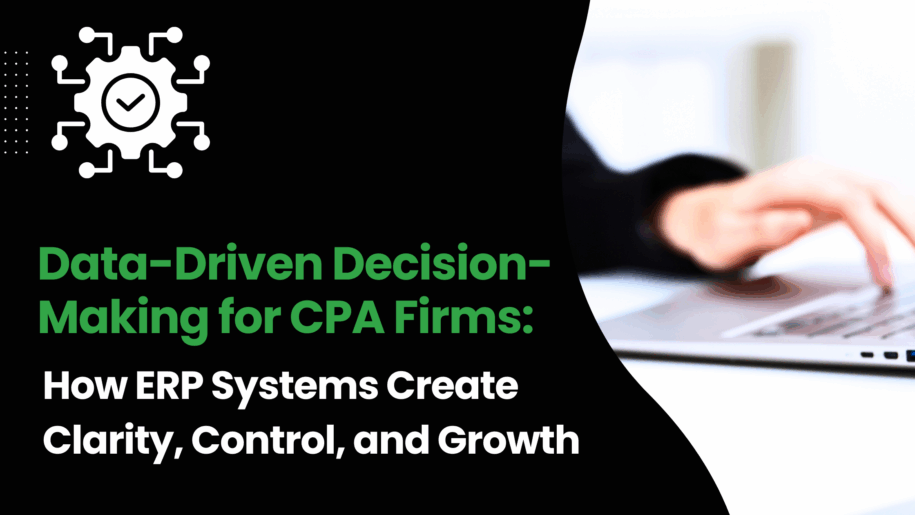
Data-Driven Decision-Making for CPA Firms: How ERP Systems Create Clarity, Control, and Growth
Why Data-Driven Decision-Making Matters for CPA Firms In today’s competitive accounting landscape, intuition is no longer enough. CPA firms are under pressure to operate more efficiently, serve clients better, and make faster, smarter decisions. The firms that succeed are those … Read More
CPA Burnout Is Real: How Unified Technology Can Help Firms Reclaim Time and Focus
CPA Burnout Is No Longer a Buzzword—It’s a Reality CPA burnout is no longer anecdotal—it’s measurable, persistent, and impacting firms of all sizes. In a recent collaborative webinar hosted by Workiro and PracticeERP, industry experts explored why burnout is accelerating … Read More
